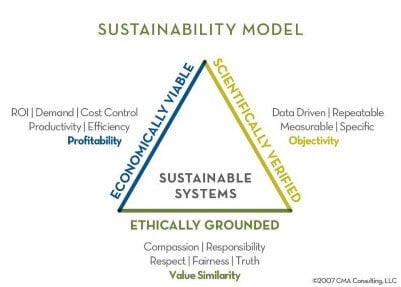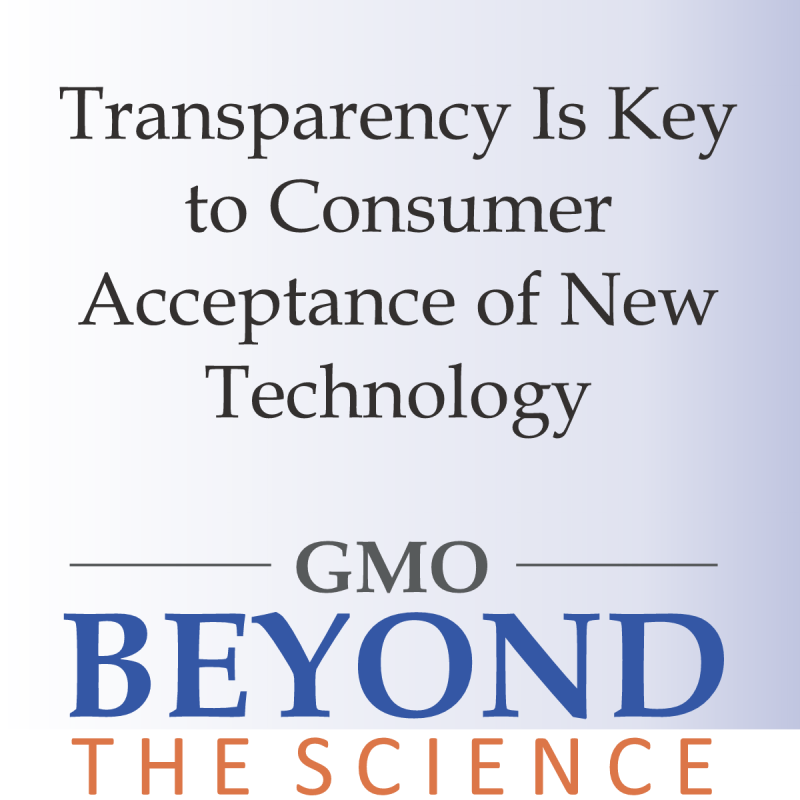 Charlie Arnot, CEO, Center for Food Integrity | February 9, 2017
Charlie Arnot, CEO, Center for Food Integrity | February 9, 2017
ALSO READ:
Will – And Should – Gene Edited Animals Be Regulated?
Alison Van Eenennaam
The benefits of gene-editing technology are far reaching. Pigs that are immune to devastating diseases. Cows that don’t grow horns would eliminate the animal welfare controversy associated with removing them. Hens that produce only female offspring would do away with the need to euthanize male chicks. The technology is also being tested for its ability to edit fruits and vegetables to increase their edible flesh, resist browning and slow down ripening.
But, it remains to be seen if gene-editing technology can avoid the stigma many consumers associate with GMOs.
When GMOs were introduced, scientific research and regulatory agencies said conclusively they were safe, so not much consideration was given to providing additional details to consumers. This unintentional lack of transparency eroded consumer trust in the technology and the food system in general.
When consumer focus groups convened by The Center for Food Integrity (CFI) were told GMOs have been used for 20 years with no ill health effects, the reaction was not relief. They wanted to know why they didn’t know about them sooner.
“This is beyond scary to me,” one woman replied. “I feel like I’ve been deceived. The fact that we’ve been eating this stuff [for decades] … why weren’t they providing more information all along about what I’m eating?”

Two decades after they were introduced, GMOs are still under attack in the United States and the technology’s adoption around the world is being hampered. Will gene-editing technology experience a similar fate or can it be another step toward the next Green Revolution?
Transparency is essential to building trust. Consumers want all the details so they can decide for themselves. Simply reporting facts and science does not fulfill consumers’ definition of transparency. They don’t just want to know whether something “can” be done but whether it “should” be done. Is it the right thing to do? Food producers must commit to communicating an ethical foundation for their work.
For a sustainable balance, communication must be grounded in ethics and then supported by science and economics. Information impacts knowledge. Ethics – or values – impact feelings and beliefs and that’s what drives consumer decisions.

Authentic transparency can transform a relationship that is tarnished with suspicion by reducing fear of the unknown and creating a platform for building trust. CFI’s consumer trust research demonstrates that as those in the food system increase transparency, they will also increase consumer trust.
Since transparency can be an elusive term, CFI first set out to define it — asking consumers who they hold most responsible for demonstrating transparency. Food companies? Farmers? Grocery stores? Restaurants? Far and away, consumers hold food companies most responsible. And not only for areas we might expect like labor and human rights and business ethics, but also for the impact of food on health and the environment, food safety, and even animal well-being.
The online survey of 2,000 people also asked precisely what consumers want and expect food producers to be transparent about – policies, practices, performance or verification? Consumers responded that transparency in a company’s or organization’s practices count most toward earning trust. That’s because practices are a demonstration of a company’s values in action, and CFI’s research shows shared values are the foundation for earning trust.
Including information on product labels, offering engagement opportunities through company websites and protecting whistleblowers all ranked as important practices in demonstrating transparency. Those practices reflect an organization’s values and become a good predictor of trust.
Food system stakeholders that believe these are not their issues do so at their own risk. CFI’s research reflects a new reality in which consumers increasingly expect their favorite brands to assure more than quality and safety. As with consumers who were upset they weren’t given more information about GMOs years earlier, consumers today expect the supply chain to be transparent about everything from production practices to ingredients.
As a result, those involved in bringing food to the table must commit to communicating the ethical foundation of their work. They can no longer assume that the public knows they prioritize safety and care about health, animal well-being, and the environment, among other things. They must be willing to engage in a dialogue with consumers and to embrace and answer their questions in an honest, open manner.
CFI’s research leaves no doubt that effectively demonstrating transparency will help those in the food system increase public trust in their people, processes and products. Some farms and food companies have embraced this reality and pulled back the curtain. The journey may not be simple, but the reward – earning consumer trust – is priceless.
 Charlie Arnot is the CEO of the Center for Food Integrity. The Center for Food Integrity is a not-for-profit organization that helps today’s food system earn consumer trust. Our members and project partners, who represent the diversity of the food system, are committed to providing accurate information and working together to address important issues in food and agriculture. The Center does not lobby or advocate for individual companies or brands. For more information, visit www.foodintegrity.org.
Charlie Arnot is the CEO of the Center for Food Integrity. The Center for Food Integrity is a not-for-profit organization that helps today’s food system earn consumer trust. Our members and project partners, who represent the diversity of the food system, are committed to providing accurate information and working together to address important issues in food and agriculture. The Center does not lobby or advocate for individual companies or brands. For more information, visit www.foodintegrity.org.
The Genetic Literacy Project is a 501(c)(3) non profit dedicated to helping the public, journalists, policy makers and scientists better communicate the advances and ethical and technological challenges ushered in by the biotechnology and genetics revolution, addressing both human genetics and food and farming. We are one of two websites overseen by the Science Literacy Project; our sister site, the Epigenetics Literacy Project, addresses the challenges surrounding emerging data-rich technologies.































